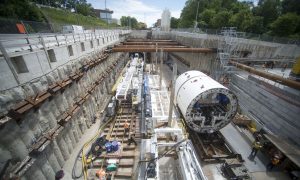Transnet Freight Rail introducing new operating model

Transnet Freight Rail (TFR) is introducing a new operating model hoped to bring about improvement in customer efficiency.
“It will bring about significant efficiencies for customers – decentralising key responsibilities to ensure a more responsive rail freight network that is better equipped to service the South African economy” said Sizakele Mzimela, chief executive of TFR.
TFR’s inability to get agricultural products by rail faster to markets with lesser costs, paved way for agricultural companies to look unto roads and flights, which today, contributes about 98% of all logistical costs.
In 2011, TFR briefed Parliament Portfolio Committee on Agriculture, Forestry and Fisheries on the decline in the rolling stock and a need for a major investment.
TRF currently moves around 17% of South Africa’s freight, with a network of 31 000 km railway track, connecting with other rail networks in the sub-Saharan region. It earmarked the rise of small and mega farmers who have on-farm silos, supplying local mills.
Mzimela said that they were introducing the concept of six operational ‘corridors’ from August 2020, each with its own localised decision-making structures at operational level. “This will ensure higher levels of operating efficiency, a more dynamic approach to costs and pricing, and greater customer satisfaction.”
TFR believed that it could regain the lost market of farmers it once enjoyed. Farm gate rends indicated a rise in farmers shipping their produce to local mills bypassing established silos. This had a direct benefit for TFR, enabling the company to supply freight rail service to local mills.
“We see the new strategic business corridors as the operational nucleus for TFR’s growth, and with it the growth of the South African economy. It will be where the key leadership and technical capacity is located, so we can pay greater attention to moving cargo with speed from production points to ports, and vice versa” said Mzimela.
The new operating model opened possibilities for smallholder farmers to trade in the SADC region. Transnet rail infrastructure represented about 80% of Africa’s total capacity, and connected with sub-Saharan rail links.
The appointment process for Cape Corridor 2 (Kimberley/Port Elizabeth) is currently underway. The following executives have been appointed to run the TRF’scorridors:
- Ms Mandisa Mondi, North Corridor, to be based in Richards Bay
- Ms Chuma Mokoena, Natal Corridor, to be based in Durban
- Mr Lloyd Tobias, Cape Corridor 1, to be based in Saldanha
- Mr Mashudu Makatu, North-East Corridor, to be based in Nelspruit
- Mr Rudzani Ligege, Central Corridor, to be based in Pretoria
“In addition to increasing our customer responsiveness, the new business model will empower Transnet executives at local level and ensure a closer focus on the needs of their customers,” Mzimela said.



















